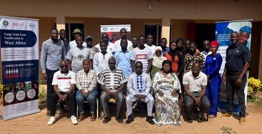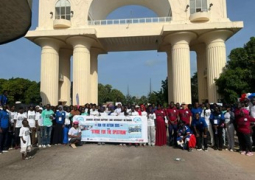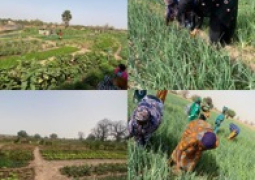
The advocacy seeks to enable countries feasibly track trends in the effective coverage and nutritional impact of food fortification and bio-fortification overtime in populations. FORTIMAS was developed and deployed and The Gambia introduced the use of this tool in 2021 to monitor the country’s food fortification and bio-fortification programme.
The Catholic Relief Service (CRS) The Gambia Country Program (CP) granted NaNA additional funding from the Large-Scale Food Fortification Project to bolster stakeholder capacities on the FORTIMAS (data Collection.)
Speaking at the event, Mary Johnson, director of Regulatory Affairs and Enforcement at Food Safety and Quality Authority (FSQA), while describing the training as ‘timely and important’, acknowledged that the training will support FSQA and all its partners to implement the food fortification but most especially the issues of data, monitoring, surveillance and enforcement.
She revealed that FSQA has been playing a very important role since the initiation of food fortification in the country, saying partners have not also left them behind in implementing food fortification in the country.
She described FORTIMAS as a very important tool that would greatly help in shaping the pace for food fortification as well as monitoring and surveillance.
“This partnership shows that all partners have a stake in food fortification because the end goal is to ensure there is no micronutrient deficiency in the country and sub-region at large.” she stated.
Bernard Toni, technical adviser for Monitoring, Evaluation, Accountability and Learning (MEAL) and Data Systems for the Large-Scale Food Fortification, Catholic Relief Service (CRS), West Africa Regional Office, pointed out that micronutrient deficiencies are very common in West Africa and contributes to about 25% of maternal deaths that occur in the sub-region.
“Micronutrient deficiencies have been recognised in the sub-region as a major public health concern which led to CRS and ECOWAS joining hands to come up with the Large-Scale Food Fortification project.”
He recalled that at last month’s meeting in Benin, it was discovered that the sub-region is faced with constraints of data and coordination, among others, especially in the areas of micro-nutrient deficiencies and programme on fortification.
Toni informed that at the meeting they came up with a possible potential solution, which he said, is to strengthen monitoring and surveillance to address the issue of data availability which resulted to the FORTIMAS training.
He thus urged participants to take the training seriously and participate effectively to ensure the outcome is of benefit to the country.
Malang N. Fofana, acting executive director for the National Nutrition Agency (NaNA), while thanking CRS for their partnership, highlighted that food fortification has three important perspectives and everyone everywhere has a role to play in it.
Fofana reminded that as a country they have developed policies to address the triple burden of under-nutrition, over-nutrition and malnutrition deficiencies, that the country faces.
Thus, he said, fortification has moral and social importance and to be able to address micronutrient deficiencies, they need to fortify foods that are most commonly consumed in the country to ensure they have a healthier population.





